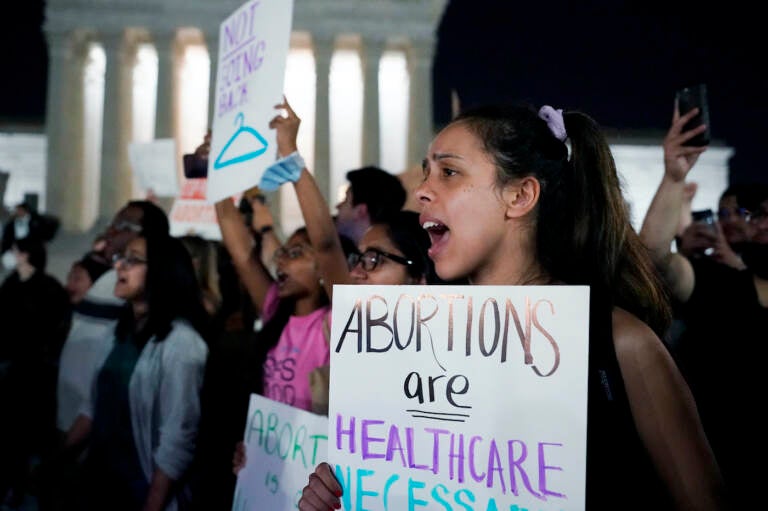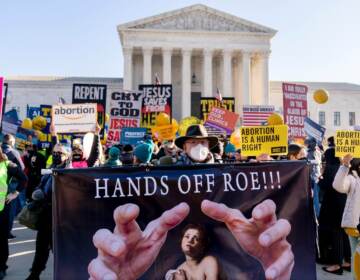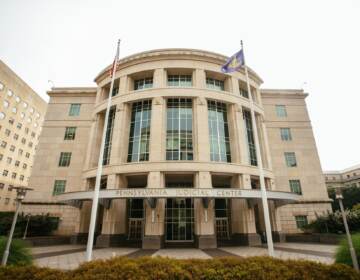What the Roe v. Wade overturn means for abortion rights in Pa., N.J., and Del.
Here is the outlook for abortion access in Pennsylvania, New Jersey, and Delaware after the SCOTUS ruling to overturn Roe v. Wade.

A crowd of people gather outside the Supreme Court, early Tuesday, May 3, 2022 in Washington. (AP Photo/Alex Brandon)
Friday’s long-anticipated U.S. Supreme Court ruling has overturned Roe v. Wade, though that doesn’t mean that there will be a nationwide ban on abortions. Instead, abortion policy will be left up to state and local lawmakers.
Twenty-six states are now certain or likely to ban the procedure, according to the Guttmacher Institute.
Residents in Pennsylvania, Delaware, and New Jersey won’t be immediately affected by the Supreme Court’s decision — however, that could change by November’s midterm elections, especially in the Keystone State.
Beyond abortion care, the Roe reversal could have other, serious implications for Americans across all states, including decreased access to birth control, increased violence at clinics, and violations to digital privacy.
Here’s a round-up of what’s at stake in our region.
Pennsylvania
In Pennsylvania, abortion is legal up to 24 weeks after a person’s last menstrual period. A patient seeking an abortion must receive state-mandated counseling that includes information designed to discourage them from having an abortion, and then wait 24 hours before the procedure is provided.
Health plans offered in the state’s health exchange under the Affordable Care Act can only cover abortion if the person’s life is endangered, or in cases of rape or incest.
In 2020, there were 32,123 abortions performed in Pennsylvania, according to data from the state’s health department. Nearly half were to white individuals, followed closely by Black patients at 44%. About 11% of abortions performed in Pennsylvania were for Hispanic patients.
For now, abortion remains legal for Pennsylvanians. Governor Tom Wolf has been a strong advocate for abortion rights in the state, vetoing several bills passed by the Republican-controlled General Assembly that would further restrict abortion access. At a May rally in Philadelphia, Wolf promised to continue opposing anti-abortion legislation during his remaining months in office.
But come November, Pennsylvania voters will be choosing a new governor, and only one candidate — Attorney General and Democratic nominee Josh Shapiro — has vowed to maintain abortion protections. Sen. Doug Mastriano, the Republican nominee, introduced a so-called “heartbeat” bill to Pennsylvania in 2019, which would ban abortions after six weeks of pregnancy. (Medical and reproductive health experts say an embryo does not have a developed heart at six weeks’ gestation.)
Mastriano, a devout Christian who has made his religion central to his political career, has abortion views that go beyond much of the GOP. He has said he supports a total ban on the procedure without exceptions — including for rape, incest, or a medical emergency in which the parent’s life is at risk — and that he would pursue abortion policies that reflect those beliefs as governor.
One other caveat: No matter who lands in the Pennsylvania governor’s seat, a constitutional amendment is making its way through the state legislature that advocates say could have dire consequences for abortion access in the state. The GOP-proposed amendment would explicitly say the Pennsylvania constitution does not guarantee any rights related to abortion or abortion funds. That means that Democrats would have no ability to challenge anti-abortion laws in state courts. The governor does not have the power to veto constitutional amendments. If the legislature passes the proposal, it will go before voters in a statewide referendum as early as May 2023.
Following the leak of the draft of the Supreme Court’s opinion in May, Democrats in the U.S. Senate moved quickly to try and pass legislation that would enshrine the 50-year-old ruling into federal law, but they were blocked by the GOP filibuster of the bill. Without Roe, protecting abortion rights nationally would require adding Democrats to the Senate, which means November’s race in Pennsylvania will be “all about this issue,” attorney Kathryn Kolbert said on WHYY’s “Radio Times.” Democratic U.S. Senate candidate John Fetterman has said protecting reproductive freedom is “non-negotiable,” while Republican Mehmet Oz “looks forward to supporting pro-life legislation.”
If Pennsylvania’s current abortion laws remain intact, experts say there may be another outcome in a post-Roe world: Abortion providers in the state will likely see a surge in demand from out-of-state patients seeking the procedure. A report from the Guttmacher Institute estimates that the number of people within driving distance of Pennsylvania who could seek abortions there would increase by more than 1,000% if Roe is overturned — from 170,000 annually now, to 2.1 million. Though New Jersey’s and Delaware’s abortion protections are not at risk, neighboring Ohio is poised to pass an abortion ban after today, and West Virginia will also likely enact a ban.
Elicia Gonzales, executive director of ALF-PA, told WHYY News that she worries Pennsylvania health care providers and the state’s abortion funds will not be able to meet the demand of patients coming into the state seeking abortion care.
Planned Parenthood Keystone CEO and President Melissa Reed said the country is “at a crisis moment for abortion access,” but the organization has spent many months preparing for the moment, including expanding abortion availability in the state via telemedicine and direct-to-patient medical abortion, which sends abortion medication through the mail.
New Jersey
The right to an abortion — at all stages of pregnancy — is protected in New Jersey, thanks to the state’s Freedom of Reproductive Choice Act, which Governor Phil Murphy signed into law in anticipation of a Roe v. Wade reversal in January.
The bill codifies a person’s right to abortion in New Jersey, extending that protection beyond the federal constitution. Unlike the previous version of the measure, the bill that passed this year does not require insurance providers to cover abortions.
Following the Roe reversal, Murphy signed two additional bills into law that aim to protect those from outside the state who are seeking abortion services within New Jersey’s borders. The new legislation allows out-of-state patients to access confidential abortion services without fear of being prosecuted. It also barrs the extradition of people involved in reproductive health care services should they face charges in another state.
In 2019, the state reported that 22,178 abortions were performed at hosptials and licensed ambulatory care facilities. Reporting of abortions is not mandatory in New Jersey for private physicians and women’s centers.
Similar to Pennsylvania, New Jersey is likely now to become a “safe haven” for those seeking abortions from other states.
Delaware
Abortion in Delaware is legal up to fetal viability, or after viability if the patient’s health is endangered, or if there is a lethal fetal anomaly.
Abortion was prohibited until 2017, when the state’s General Assembly repealed its pre-Roe ban and passed a law specifically protecting reproductive freedom.
That law ensures that abortion will remain legal in the state, even after the overturn of Roe v. Wade.
State representatives have tried since to pass restrictions on the procedure, but without success.
Delaware’s General Assembly has also passed legislation that expands the state’s pool of abortion providers and protects the health records of people who trek to Delaware from places with restrictive abortion laws.
In 2019, there were 2,042 abortions performed in Delaware, 1,765 to residents, and 277 to non-residents, according to data from the state’s Department of Health and Social Services.
WHYY is your source for fact-based, in-depth journalism and information. As a nonprofit organization, we rely on financial support from readers like you. Please give today.








